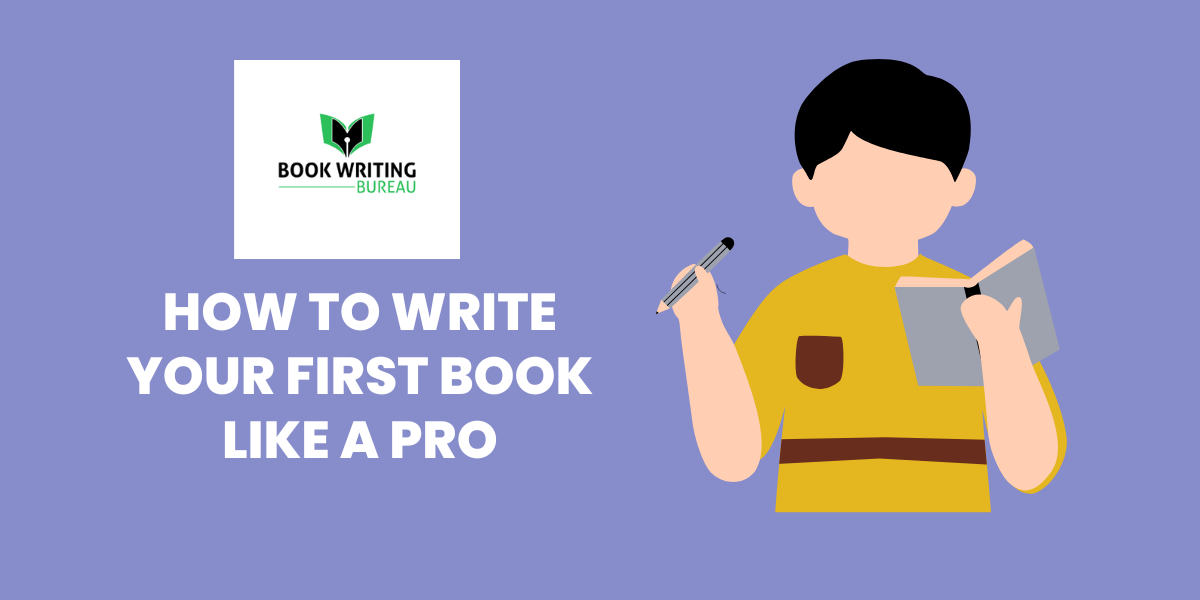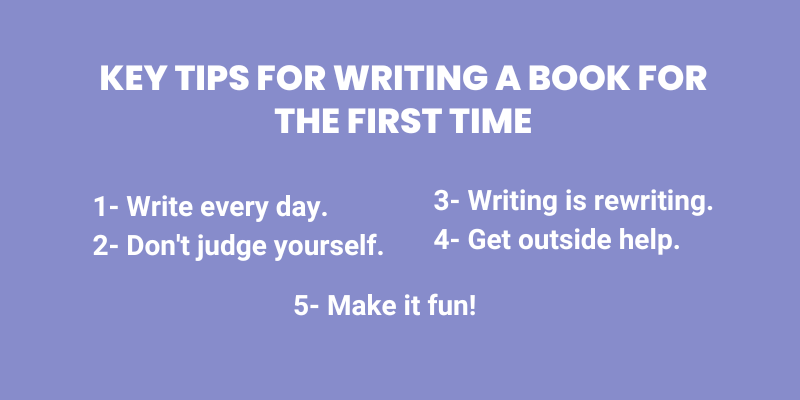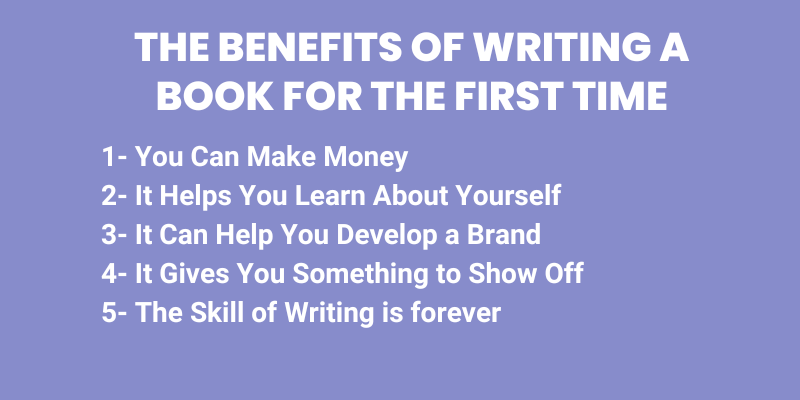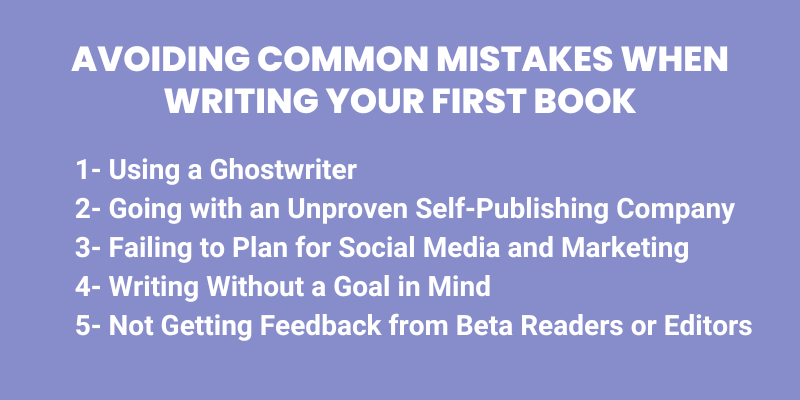
Writing
Enjoy the entire article by clicking on the audio play button!!!
Have you always dreamed of writing a book but never knew where to start? Putting your thoughts on paper can be daunting, but anyone can become a published author with the right guidance.
In this blog post, we’ll share expert tips and tricks to help you write your first book like a pro. From brainstorming ideas to crafting a compelling plot, we’ll cover everything you need to know to start your writing journey.
Whether you’re a seasoned writer or a beginner, our insights will help you gain the confidence and skills to create a book that readers will love. So, grab your pen and paper, and let’s start writing your best seller together!
Key Tips for Writing a Book for The First Time

Are you ready to take the leap and write your first book? Congratulations, that’s a huge accomplishment! However, you may feel overwhelmed by the task at hand. Don’t worry; we’ve got you covered. Book writing company brings you a few key tips for writing a book for the first time. So, let’s get started!
1- Write every day.
The more you write, the better you’ll get. If you can’t make time to write every day, try to do it at least three times a week, even if it’s just thirty minutes at a time!
The best place to write is somewhere other people are around, and there are distractions. It can be the kitchen table or a local coffee shop; both are good options. If possible, try not to schedule anything else during these times. This way, you won’t have excuses for not completing some work.
2- Don’t judge yourself.
The first step to writing your book is not worrying about making mistakes. The second is not to judge yourself for those mistakes. The third is to just start writing!
You may be worried that other people will think your book isn’t good enough or interesting enough, but don’t worry about that. Just write something fun and let it go from there! You can always change things later on if they need improving (and trust me–it probably does).
3- Writing is rewriting.
The most important thing you need to know about writing: writing is rewriting. The first draft of any book will be bad, and you should expect that. It’s okay! We all start somewhere, and nobody gets good at anything without practice. But if you want to ensure your book turns out well, don’t skip over this step–rewriting is where all the magic happens!
4- Get outside help.
A good editor and writing company can make all the difference in your book, not just by correcting grammar and spelling mistakes. They help you find places where you are losing readers’ interest; they point out when plot points are confusing, or characters aren’t believable.
They catch inconsistencies that could throw off your readers’ suspension of disbelief. If money is an issue for you (and it often is), consider hiring an editor through an online marketplace like Reedsy or Upwork instead of working directly with someone who charges by the hour–you’ll get more bang for your buck. Join a writing group or attend workshops at libraries and community centers.
5- Make it fun!
The first step to writing your book is finding a good place to write it. Find somewhere quiet where you can focus and get some work done.
There are many ways that authors find inspiration for their books: they might read other writers’ work or listen to music while they write; sometimes, they even take walks outside (if this sounds interesting, check out our post on how writers find inspiration). You might want to try some of these things yourself!
Writing a book is hard, but you can do it!
You’ll be proud of yourself for taking on this challenge and completing the task. You’ll learn a lot about yourself and your professional skills in the process. And even if no one buys or reads your book, you’ll still enjoy the process of writing it.
That’s because it will help you grow as a person and professionally by doing something different than what most people do. Plus, there’s always the chance that someone might read it someday (or now!), which means fame could be just around the corner! Or maybe not… but either way: money!
The Benefits of Writing a Book for the First Time

Writing a book is a great way to share your knowledge with others; if you do it right or even get help from ebook writing service providers, the benefits are endless.
1- You Can Make Money
You can make money from book sales. Even if you have no intention of becoming a best-selling author, writing a book will help you earn some extra cash. The initial sale of your book will likely pay for all the costs associated with publishing it, including editing and cover design. Once published, you’ll also be able to sell copies on Amazon (or another platform) for as much as $15 each.
You can make money from book promotion. If your book is good enough to be published by an established publisher like a book publishing company or Simon & Schuster, they’ll help promote it. You may also find yourself doing speaking engagements related to your book’s topic.
This could include everything from giving presentations at conferences or seminars all over the world through local meetups. Consultants who specialize in specific industries often charge higher rates. It is because they bring unique knowledge and expertise into every project they work on. So if there are areas where people need advice, consider becoming one yourself!
2- It Helps You Learn About Yourself
You will learn what you are good at. You may think that the thing you’re working on is easy, but once it’s done, it can be hard to see how much time and effort went into it. This can be frustrating when you look back and realize how much more effort you could have put in.
It also helps us learn what we aren’t good at and why we struggle with certain things in life (or work). We might feel like we should be able to do something perfectly right away, but this isn’t always possible. It is because some things take time and practice before they become second nature for us.
3- It Can Help You Develop a Brand
A brand is your reputation and identity. It’s what people think about you or how they identify you. If your business is a website that sells products online, the “brand” could be the name of your site.
If it’s an app that helps people find information quickly, then maybe “brand” would mean how easy it is to use (and how fun). The best brands are the ones people choose because they feel an emotional connection with them.
4- It Gives You Something to Show Off
You can use it as a reference point in the future or even as an advertisement for more work. You might even use it as part of an interview process – if someone asks what projects you’ve worked on. Having one book under your belt will make them wonder what else is out there! It also serves as a stepping stone for future works: if this first book is successful, publishers will likely want more books from you!
So, what should you write your first book about? That’s up to you. The best way to decide is by looking at your current skills and interests. If you’re good with numbers, then maybe an accounting textbook would be right up your alley! Or if you know a lot about animals and their behavior, then perhaps writing a children’s book would be perfect for you.
5- The Skill of Writing is forever
Writing is a skill that will last you a lifetime, and you can use it in many different ways and fields. It can help you communicate better with others, yourself, and your future self.
We’re all familiar with writing at some point in our lives. However, writing doesn’t have to be limited to those two things! If you’ve never thought about writing before but want to try out this new hobby or career path, you should write your first book.
Avoiding Common Mistakes When Writing Your First Book

Writing a book is a big undertaking, but it’s also one of the most rewarding experiences in life. For many authors, writing has been a lifelong dream; others have always wanted to try their hand at it.
Still, others have dreams of writing for profit or as a way to get their message out there. Whatever your reason for writing, here are some common mistakes to avoid so you can make sure your hard work doesn’t go to waste:
1- Using a Ghostwriter
If you’re looking for ghostwriters near me, be sure to ask for references and samples of their work. If the person is a good fit for your book, it’s worth paying their fee. However, if they don’t have much experience writing books or have never written in your genre (e.g., romance), this may not be a good choice for you as an author.
2- Going with an Unproven Self-Publishing Company
As with any business, it’s important to do your due diligence before choosing a self-publishing company. A reputable book publishing company will have a website that is easy to navigate and provides information about its services, including prices and packages they offer. If the site looks outdated or otherwise unprofessional, be wary of working with them.
If you can’t find much information on the company’s website, try searching for reviews of their services online. It may also be helpful to ask if they are willing to work with you on your goals.
3- Failing to Plan for Social Media and Marketing
Social media is a huge part of marketing your book, but it’s easy to forget about it when you’re busy writing. It’s also easy to get caught up in the technical details or not know where to start.
Know what you want from each platform. Many people have multiple accounts because they think they need one for every platform. But if all your followers are on Facebook and none are on Twitter, then having two versions won’t help much! Figure out which platforms will help reach your target audience and what kinds of content work best before launching any new channels.
Decide how exactly you will measure success–you should always have a goal in mind when starting anything new (especially when trying new tools).
4- Writing Without a Goal in Mind
When you write your first book, knowing what you want to achieve is important. A goal can be anything from “I want to write a novel” or “I want my book to sell well.” Having a goal will help keep you motivated and focused on the task at hand–and while this may seem like common sense, many people who start writing books don’t have a clear idea of what they want out of the process.
5- Not Getting Feedback from Beta Readers or Editors
As a writer, taking criticism and advice from others can be difficult. We all have our ideas about what works in a story and how things should be written, so when someone tells us that something needs to change or be fixed, it can feel like they’re attacking our work because they don’t understand how brilliant we are!
The truth is that most writers need feedback from other people if they want their writing skills to improve enough so that they’ll eventually be able to publish a book (or more). That’s why getting beta readers involved early in the process of writing your first book is so important–they’ll give you an idea of whether or not there are any major issues with your story before publication day comes around.
Conclusion:
The first step to help you write your first book is to decide what you want it to be about. The second step is just as important: make sure that the idea is good! If you have trouble coming up with ideas, try brainstorming with friends or family members who might have fresh perspectives. Once you have your idea down, start writing!



